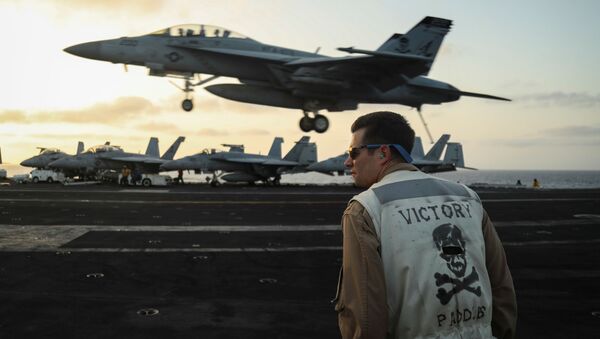China has warned against opening Mideast 'Pandora's box' after the United States authorised the dispatching of additional military personnel to the Middle East "to address air, naval, and ground-based threats" in the region, according to AFP.
China's Foreign Minister Wang Yi stated following a press conference with his Syrian counterpart Walid Muallem that Beijing is urging Tehran to keep its commitments under the nuclear deal, and has warned against scrapping the pact 'so easily'.
Wang noted that the International Atomic Energy Agency had confirmed on multiple occasions that the Islamic Republic has remained committed to its obligations under the nuclear treaty.
"The International Atomic Energy Agency has confirmed 15 times that Iran fulfills its obligations under the JCPOA. In the existing situation we hope that Iran will very thoroughly contemplate its decision and will not reject the deal so easily", Wang said at a press conference held after his talks with Syrian Foreign Minister Walid Muallem.
Wang Yi added that China remains firmly committed to protect the Joint Comprehensive Plan of Action, including through cooperation with other signatories for the sake of Arak nuclear reactor modernisation.
"China's commitment to protect the JCPOA remains unchanged. As a specific measure, China will closely cooperate with all the sides in order to reach progress in modernising the Arak nuclear reactor", Wang said at a press conference held after his talks with Syrian Foreign Minister Walid Muallem.
His comment came one day after the Atomic Energy Organization of Iran announced that the country would in late June exceed the enriched uranium stockpile limit outlined in the JCPOA, while it could also exceed the heavy water stockpile limit and the level of uranium enrichment specified in the deal.
Iran first announced that it would start suspending some of its voluntary commitments under the JCPOA within 60 days on 8 May – exactly one year after the US unilaterally pulled out from the deal and decided to reinstate all sanctions against the Islamic Republic.
The Joint Comprehensive Plan of Action (JCPOA), commonly known as the Iran nuclear deal, was signed in 2015 by Iran and the P5+1 nations — Russia, the US, China, France, the UK plus Germany — after years of tense negotiations. The multilateral accord sought to curb Iran's nuclear ambitions in exchange for the gradual lifting of economic sanctions on Tehran.


